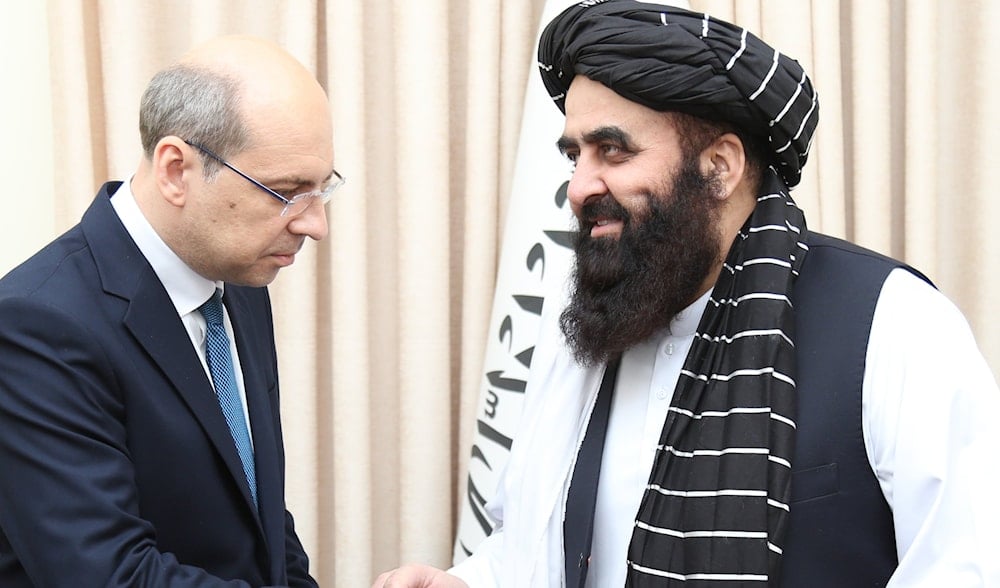Russia becomes first to recognize Taliban govt. since 2021 takeover
By formally recognizing the Taliban government, Russia positions itself as a pragmatic regional player, aiming to expand trade, security, and diplomatic ties with Afghanistan.
-

The Ambassador of the Russian Federation, Mr. Dmitry Zhirnov, meets with IEA-Foreign Minister Mawlawi Amir Khan Muttaqi, conveying his government’s decision to recognize the Islamic Emirate of Afghanistan. (Russian Ministry of Foreign Affairs)
Russia has become the first country to formally recognize the Taliban-led government in Afghanistan since the group seized power in 2021, the Russian Foreign Ministry confirmed Thursday. The announcement marks a major diplomatic shift and comes after Moscow accepted the credentials of a new Afghan ambassador.
“We believe that the act of official recognition of the government of the Islamic Emirate of Afghanistan will give impetus to the development of productive bilateral cooperation between our countries in various fields,” the Russian Foreign Ministry said in a statement.
The ministry emphasized future cooperation in trade, energy, transport, agriculture, and infrastructure, and pledged to support Kabul in “strengthening regional security and combating the threats of terrorism and drug-related crime.”
Diplomatic milestone, regional ambitions
A photograph released with the announcement showed Gul Hassan Hassan, the Taliban’s new ambassador to Russia, presenting his credentials to Russian Deputy Foreign Minister Andrey Rudenko.
The Taliban’s Foreign Ministry called the recognition “positive and important,” sharing images of its Foreign Minister Amir Khan Muttaqi meeting with Russian Ambassador to Kabul Dmitry Zhirnov.
The move cements a historic turn in Russia-Afghanistan relations. Following the US withdrawal from Afghanistan in 2021, Russia maintained its diplomatic presence in Kabul. In a significant policy shift this April, Moscow removed the Taliban from its list of designated terrorist groups, paving the way for Thursday’s recognition.
In the 20 years during which the NATO-led coalition invaded Afghanistan, the Southern-Central Asian country has suffered tremendous destruction at unprecedented levels, leaving it crippled by an excruciating economic crisis.
The war-torn nation has sought to recover from the damage by forging alliances with global powers, including China and Russia.
Since then, trade between Russia and Afghanistan has markedly surged in recent years, rising from $170 million in 2022 to over $1 billion presently.
Wider context
Although the Taliban has established working diplomatic ties with China and the UAE and maintains a political office in Qatar, Russia is the first nation to formally recognize its government. Until now, no country had officially accepted the Taliban as Afghanistan's legitimate rulers.
International business activity has proceeded regardless. In 2023, a Chinese energy company signed a deal with the Taliban for oil extraction rights, signaling growing global interest in Afghanistan’s untapped resources.
Meanwhile, the Taliban is actively lobbying for recognition from the United States, particularly since US President Donald Trump began his second term earlier this year. In March 2025, the group released two American detainees, prompting Washington to lift multimillion-dollar bounties on three senior Taliban leaders.
According to CNN, the Taliban has proposed opening a representative office in the US to handle Afghan affairs, among other diplomatic gestures. During recent talks to secure the release of an American citizen, US officials reportedly told Taliban negotiators, “You need to be forthcoming and take a risk. Do this, and it will likely open up the door for a better relationship.”
This move builds on earlier diplomatic engagement. In 2020, toward the end of Donald Trump’s first term, the United States signed a military withdrawal agreement with the Taliban. The deal paved the way for the group’s swift return to power in 2021, after the chaotic withdrawal and the end of America’s two-decade occupation, an era marked by widespread destruction, mass displacement, and the deaths of hundreds of thousands of Afghans.
Read next: Russia doubles gas exports to Afghanistan

 4 Min Read
4 Min Read










